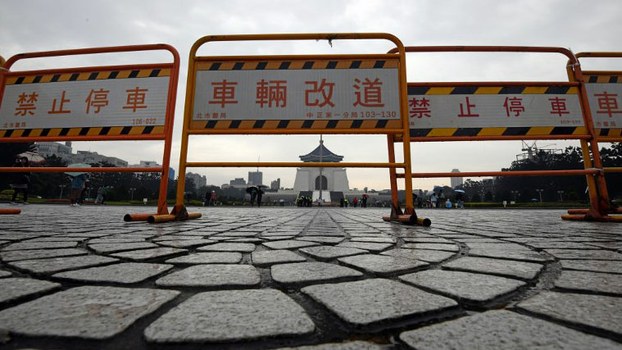




Taiwan marked the 71st anniversary of the Feb. 28 massacre on Wednesday, as the tomb of late Generalissimo Chiang Kai-shek, who presided over the killing, was covered by activists with red paint symbolizing blood.
Hundreds of protesters earlier took to the streets in a call for justice for the victims of a Feb. 28, 1947 massacre of local civilians in which an estimated 18,000 to 28,000 people died at the hands of Kuomintang, or Nationalist, troops.
Protest organizer Cheng Ching-hwa said families of victims say they still don't have details of what happened to their loved ones, amid growing calls for the removal of Chiang's statue and image from public places in the now democratic island.
"We want to emphasize that this is a movement, not an activity, and the most important thing is that we want the government to speed up its work on transitional justice," Cheng told journalists. "We want Taiwan to become a normal, healthy country."
Relatives of the victims are also calling on the government to list those responsible for the massacre in official records and textbooks, as well as opening up restricted records to researchers and historians.
The KMT government, which relocated entirely to Taiwan in 1949 after losing a civil war to Mao Zedong's communists on the mainland, kept records of the era secret throughout its rule.
Taiwan defense ministry spokesman Chen Chung-chi called on the public to remain "calm and rational" on the 71st anniversary of the massacre, the island's Central News Agency reported.
But a pro-independence group of people calling itself "From Ethos to Nations" has claimed responsibility for the act, posting photos of the act of vandalism on a Facebook page, it said.
"True transitional justice will never happen as long as national resources continue to be dedicated to memorializing the Chiang family," it said.
Transitional justice provides a way of addressing large scale or systematic human rights violations so numerous and so serious that the normal justice system will not be able to provide an adequate response, according to a definition on the website of the International Center for Transitional Justice at www.ictj.org.
Taiwan president Tsai Ing-wen, whose independence-leaning Democratic Progressive Party (DPP) routed the formerly ruling Kuomintang (KMT) when she took power in 2016, says her government is behind the approach.
"Even 71 years later, the truth about the 2.28 incident will still be revealed," Tsai said in a speech later posted to her Facebook page.
"In the past year, with the combined efforts of the National Archives, the Academia Sinica and the 2.28 Memorial Foundation, we have found details of more than 1,000 likely victims in government files," she said.
"We will take the initiative ... to achieve the greatest possible clarification of historical truth," Tsai added. "The government will do everything in its power to make this happen."
Fight sparks native uprising
A 2006 report by the government-funded 2.28 Memorial Foundation found that Chiang Kai-shek bore the main responsibility for the killings, prompting victims' groups and social activists to call for an end to public veneration of the late Generalissimo.
The bloodshed was triggered after a fight broke out between government officials and an illegal cigarette vendor in Taipei on Feb. 27, 1947, sparking an uprising of native Taiwanese against the incoming KMT regime.
Further violence followed as the KMT imposed decades of martial law, including several waves of political purges of government opponents that saw 140,000 tried by military courts in an era known as the White Terror and thousands executed.
Taiwan had been ruled as a Japanese colony in the 50 years prior to the end of World War II, but was handed back to China as part of Tokyo's post-war reparation deal.
In 1947, incoming war-hardened KMT troops and hardships triggered by massive post-war inflation were a stark contrast to the five decades of relative peace and prosperity the island had enjoyed as part of Japan, and the local people rose up against their newly imposed rulers.
Tsai's KMT predecessor Ma Ying-jeou said the paint-splattering protest at Chiang's tomb was "an act of vandalism" that should be limited, and that Chiang Kai-shek had also made hugely positive contributions to Taiwan's post-war development.
"He did a lot to protect and rebuild Taiwan in the post-war era, but as the head of state at the time, of course he bears responsibility for the white terror of the 2.28 massacre and for anything else," Ma said.
Taiwan began a transition to democracy following the death of Chiang's son, President Chiang Ching-kuo, in January 1988, starting with direct elections to the legislature in the early 1990s and culminating in the first direct election of the island's president Lee Teng-hui in 1996.
Recent opinion polls indicate that there is broad political support for de facto self-rule in Taiwan, where the majority of voters identify as Taiwanese rather than Chinese.
But while the Chinese Communist Party has never ruled the island, Beijing regards it as part of Chinese territory and has threatened to invade if Taiwan seeks formal independence.
Reported by Chung Kuang-cheng for RFA's Cantonese Service, and by Hwang Chun-mei and Hsia Hsiao-hwa for the Mandarin Service. Translated and edited by Luisetta Mudie.